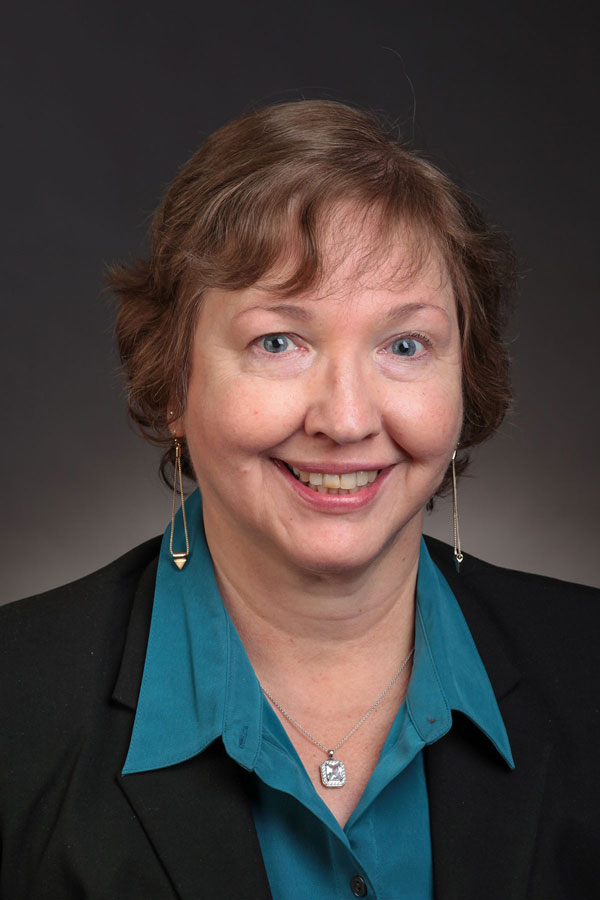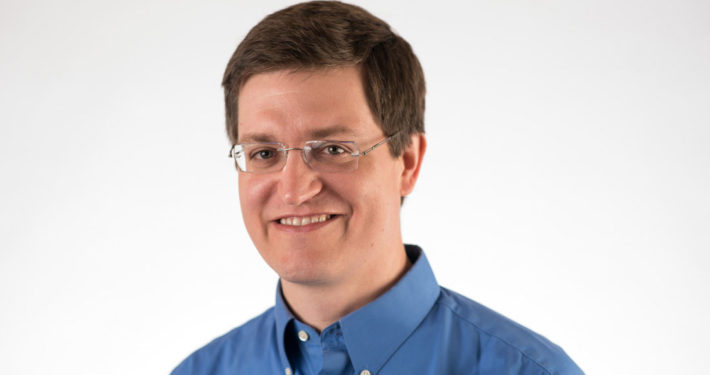Empowering Our Pediatricians
Dr. Colleen Kraft looks ahead to national leadership role.
Now, she’s bringing all of that knowledge and understanding with her to her new role as president-elect of the American Academy of Pediatrics (AAP). Kraft, a fellow of the AAP, takes office as president of the 66,000-plus member organization in January of 2018.
With a varied constituency of primary care pediatricians, specialists, sub-specialists and pediatric surgeons working in private practice and academic health systems in locations urban, rural, and everything in between, it’s a role that requires a certain global outlook, a sense of the challenges facing individual members as well as an understanding of the field as a whole.
One focus for her platform is ensuring independent pediatricians have the resources they need to thrive, as they are not only providing critical health care day in and day out, but are at the front lines of some of the largest public health challenges of our times.
“We have got to empower our pediatricians to be there and be active on the practice level,” she says, adding that supporting pediatricians in a way that allows them to fully engage in their communities has to be part of the solution when it comes to addressing some of the large social problems the AAP has identified as important, including poverty, racism, and violence.
So what’s the best strategy to help pediatricians excel in a health care environment that seems to continually demand more with fewer resources? Implementing payment models that compensate practices for the time they spend on outreach as well as care management and coordination is key, says Dr. Kraft.
“Right now, we are being paid for face-to-face care,” she says. “What are the costs of really supporting the non face-to-face care that is going to improve the outcomes?”
What’s the best way to pay for care managers, for example, or telehealth initiatives that extend the reach of physicians and improve access for families? In answering these questions, Dr. Kraft sees new ways to support the deep relationships independent pediatricians build with families, work that is at the heart of everything from the well-child visit to the loftiest public health goal. She wants to acknowledge and appreciate these relationships as a foundation for top notch health care for our nation’s kids.
“It’s powerful and it’s really undervalued,” she says. “I really want to get that understanding of value back up.”
A New System of Care
Dr. Kraft is no stranger to harnessing the power of independent pediatricians to help rethink systems in the name of improved healthcare for children and families.
As medical director of the Health Network at Cincinnati Children’s (HNCC), she plays a key leadership role for a large and diverse organization modeling new ways to deliver health care.
Dr. Kraft calls HNCC our “innovation lab for value-based payment in Medicaid.” Negotiating a per-member, per-month capitated agreement with two of the Medicaid managed care organizations in Ohio has allowed the network to help providers deliver high quality primary care and meet population health goals. The 14 primary care practices in the network receive a per-member, per-month payment on top of what Medicaid provides.
“What we require them to do is really population health 101,” says Dr. Kraft, noting that the network provides some of the staff and resources that make this work possible. One important effort centers on attribution, or working with each practice to determine the children assigned to them by Medicaid who have been in and are getting regular care, and those who have never been in for an office visit. Once the practice has a handle on the kids who haven’t been in contact, they can work on getting them in.
“We are essentially finding these kids a medical home,” she says. “And helping our practices with the phone calls, the scheduling, again some of the things they don’t have the staff or the dollars to do.”
These efforts improve the practice’s Medicaid ranking, but more importantly they improve the health of children in Ohio who may otherwise have fallen through the cracks.
Another innovation — the network’s health management team – is key to the breadth of services available through the medical home.
“We’ve got teams of nurse care managers, social workers and community health workers that are available on the ground to meet with patients as they need,” she says.
This system means that pediatricians in the network have a mechanism to address underlying issues that may have a long-term impact on the health and well-being of kids. Do families have a roof over their heads? Are there co-occurring mental health issues or addiction issues in the family? Is there access to nutritious food? Transportation? Instead of asking the pediatric practices to assume all of the responsibility for answering these questions — or leaving them unanswered — HNCC provides the resources to tackle these complex needs.
Sometimes the answer to a medical problem turns out to be surprisingly simple, and HNCC leaves room to be nimble in its solutions thanks to an innovation called the Social Investment Fund. Dr. Kraft uses the example of a child suffering from asthma that is triggered by the heat. After a health management team assesses the situation, they are able to purchase the family an air conditioner, staving off rounds of emergency department visits and potential complications. By looking at a health problem from a perspective that encompasses more than a medical diagnosis, HNCC is able to reduce utilization and improve quality of life for kids and families. Next up: using telehealth to provide speech therapy for children and families who have difficulty traveling to appointments.
A more thoroughly integrated system means access to data, and Dr. Kraft points to the quality improvement initiatives made possible by the partnerships in the network as one of its most valuable assets.
One example: the problem of chronic constipation, common in pediatrics. Instead of an immediate referral to a gastroenterologist — which carries more cost and is more time intensive and stressful for a family — HNCC has a template they provide to primary care practices in the network. The template includes the questions and tests that the specialist would cover. If, after following the template, the problem still isn’t solved, then the referral happens. Often that referral isn’t necessary, as through this system Dr. Kraft says they’ve been able to improve care and cut costs, decreasing referrals for this problem by 84 percent in the last year.
High risk case management — identifying kids who need critical services and getting them that care — has also been a priority, and there’s been real improvement in this arena. HNCC now has upwards of 300 children, out of a population of about 32,000, in the high risk case management program, as compared to just one child who had been identified for this program prior to HNCC’s founding.
This had led to improvements in the health of these children, and it also has important implications for future health care costs.
“They can become high risk and high cost kids,” she says, “and we can prevent that if we know who they are.”
Has Dr. Kraft and HNCC landed on a model that can be more broadly applied, given the current healthcare landscape and its focus on controlling costs while ensuring more people have access to care? Dr. Kraft thinks so.
“Using the expertise of the independent practices is important,” she says. “Spreading and piloting this model in areas that may be receptive to it may be a good first step.”
Meeting the Needs of Families
You might say that Dr. Kraft came to medicine at a young age. She qualified for the inaugural Head Start class in 1965 — then a summer program — which she credits with instilling in her a passion for learning. She learned to read by the age of 4, an achievement that didn’t go unnoticed.
“In Head Start one of my teachers said: ‘You are so smart. You could be a doctor when you grow up.’ And so I decided that was what I was needed to be when I grew up!”
She graduated from the Medical College of Virginia and saw in pediatrics an opportunity to help set kids up to live healthy lives. Treating some of the developmental problems that can be addressed early in life also held appeal.
Although she had an interest in many different areas of pediatrics, when she finished residency training she had a 3 year-old, 1 year-old, and a baby on the way, and decided that she “needed to do her fellowship with her own kids.” This led to private practice in Richmond, Virginia, working a flexible schedule that allowed her to juggle the competing demands of being a parent and a physician.
Dr. Kraft notes that part-time, flexible practice — sometimes denigrated as the “mommy track” — was actually key to her development as a physician. It gave her the opportunity to see first-hand the complex relationship between a child’s health and his or her environment, informing her future work as a leader in the field.
“You learn the community,” she says. “You begin to learn where some of the gaps are.”
One success story: building a partnership with a local church to offer a “Blessing of the Car Seats” event that also helped to educate parents new to the United States the proper way to install a car seat. She credits the strong relationships she had with several cultural mentors, as well as the opportunity to experience first-hand the needs of the community, with an initiative that led to improved health and safety for many kids.
Although she enjoyed being on the front lines of providing healthcare to children, it also helped her understand the flaws in the system.
“Increasingly our business model was not meeting the needs of patients and families,” she says. “We needed to start looking at social determinants of health. We had to start looking at how we can interact with schools, behavioral health, and early childhood services.”
Watch Dr. Colleen Kraft deliver her candidate presentation at the AAP national conference.
After two decades of private practice, Dr. Kraft then shifted her focus to education, thinking that training the next generation of providers in ways that helped address these systemic issues could be one answer to the problem. In 2012, she founded a pediatric residency program at Virginia Tech Carilion School of Medicine in Roanoke, now graduating its third class of residents. Around this same time she was also tapped to serve as senior medical officer for the accountable care organization formed by her employer, Carilion Clinic, and Aetna, giving her new perspective on some of the barriers the system itself creates to providing top notch care in the most efficient way possible.
“I got to see a lot of the waste in Medicaid,” she says, “and I got to think about some of the innovations, like social investment, and telehealth.”
When Cincinnati Children’s made the call with the medical director position, it was a “no brainer” to take the job, says Dr. Kraft, given the tremendous opportunity to help shape a system that addresses some of the challenges she encountered in primary care 20 years earlier.
Key to the model is partnership with independent practices. The concept of “care management” — an often-cited phrase in today’s healthcare landscape — takes on multiple, nuanced dimensions for these pediatricians, says Dr. Kraft. It’s built on the long-time receptionist knowing the names of every child in the family; the nurse understanding the transportation challenges of parents who can’t always make it to the office but welcome a home visit; the ability to call a number and speak to a person familiar with your family when a child spikes a fever or encounters an unexpected problem.
“We are missing the boat if we try to put everybody into a big, one system model,” she says. “We need to value those independent practices out there and the relationships they have with their families.”
A life-long learner, Dr. Kraft is currently studying for her MBA and expects to graduate in the summer of 2017. She also makes time to contribute to publications; she co-authored the book, Managing Chronic Health Conditions in Child Care and Schools, and has co-authored several publications on the family-centered medical home, managing toxic stress, and the value community pediatricians bring to the field. And on top of her leadership role with HNCC, Dr. Kraft continues to see patients as well as teach medical students and residents through her faculty appointment as associate professor of pediatrics at the University of Cincinnati.
“We are missing the boat if we try to put everybody into a big, one system model. We need to value those independent practices out there and the relationships they have with their families.”
“We’ve got to be looking at technology for better ways to reach out to our patients and empower our pediatricians to reach out to not only the kids who come to their office but the ones that don’t, and should.”
As she looks forward to her leadership role with the AAP and the challenges the U.S. healthcare system faces in the years ahead, Dr. Kraft points to the opportunity pediatricians have to build the health of a population from the ground up, and address some of the big picture issues facing families.
“We live in a country where almost half of our kids live below the 200 percent poverty level,” says Dr. Kraft, noting that addressing poverty’s effect on health — and all of these complicated problems — requires engaged pediatricians who know their patients in ways that go beyond a one-time diagnosis.
Technology could be part of the solution, she says, and she plans to use her AAP role to help advance initiatives related to its use in healthcare.
Some examples of harnessing technology to deliver care more efficiently and effectively: messages from a child care center that could be entered directly into an electronic health record accessible to a range of providers. Or electronic communication between a provider and a Head Start program, or a provider and a home visit program, in the name of making all relevant information available to every member of the team involved in caring for a particular child.
“We’ve got to be looking at technology for better ways to reach out to our patients,” says Dr. Kraft, “and empower our pediatricians to reach out to not only the kids who come to their office but the ones that don’t, and should.”
Ultimately, it’s all in the service of helping pediatricians from communities across the country to do what they do best: care for kids.
“The best thing you can do as a pediatrician, says Dr. Kraft, “is send a healthy, grown child into the adult health system.”
A resident of Burlington, Vermont, Erin Post has a B.A. in English from Hamilton College, and is a graduate of the writing program at the Salt Institute for Documentary Studies. She is currently working on her master’s in public health at the University of Vermont. In her spare time, she likes to bike, ski, hike, and generally enjoy the Green Mountains of Vermont.










